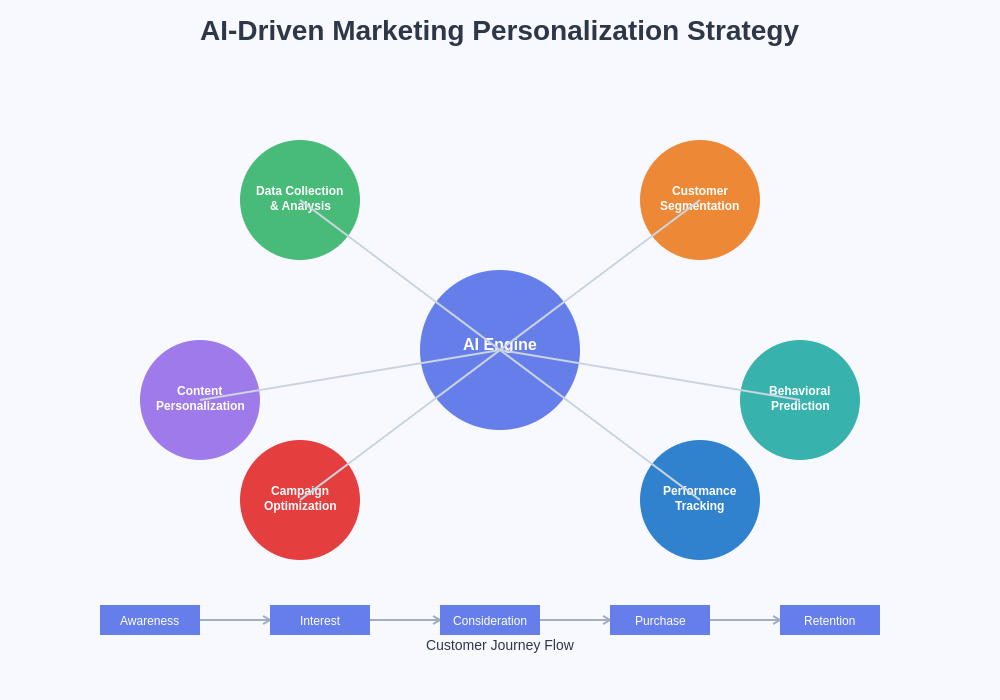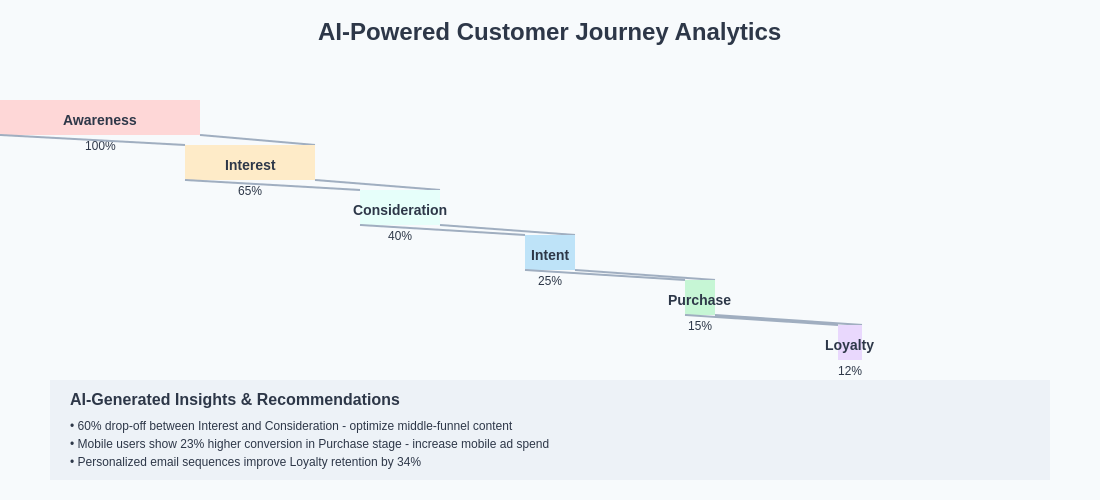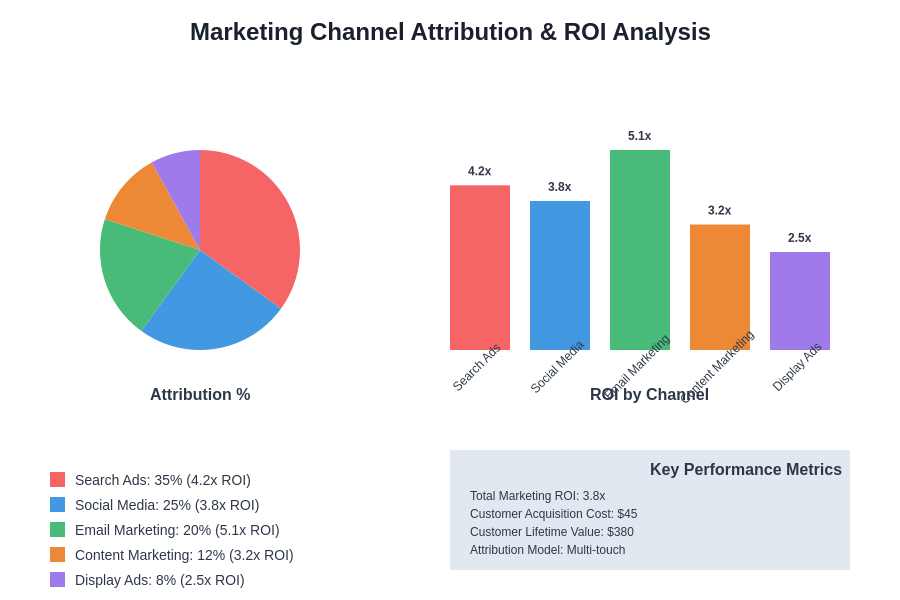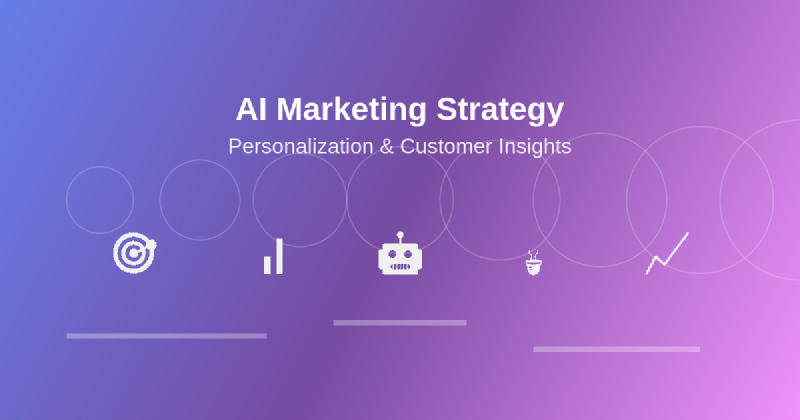The marketing landscape has experienced a fundamental transformation with the integration of artificial intelligence technologies, creating unprecedented opportunities for businesses to understand, engage, and convert customers through sophisticated personalization strategies and data-driven insights. This revolutionary approach to marketing leverages machine learning algorithms, predictive analytics, and automated decision-making processes to deliver highly targeted experiences that resonate with individual customer preferences, behaviors, and purchasing patterns across multiple touchpoints throughout the customer journey.
Explore the latest AI marketing trends and strategies to stay informed about cutting-edge developments that are reshaping how brands connect with their audiences in an increasingly digital-first marketplace. The evolution of AI-powered marketing represents not merely an enhancement of existing strategies but a complete reimagining of how businesses can create meaningful relationships with customers through intelligent automation and personalized experiences that drive engagement, loyalty, and measurable business results.
The Foundation of AI-Driven Marketing Intelligence
Modern marketing success increasingly depends on the ability to process vast amounts of customer data and transform that information into actionable insights that inform strategic decision-making across all marketing channels and touchpoints. Artificial intelligence provides the computational power and analytical sophistication necessary to analyze customer behaviors, preferences, and interactions in real-time, enabling marketers to develop comprehensive understanding of their target audiences and create highly personalized experiences that drive engagement and conversion rates.
The integration of AI technologies into marketing operations has enabled businesses to move beyond traditional demographic-based segmentation approaches toward dynamic, behavior-driven personalization strategies that adapt continuously based on evolving customer preferences and market conditions. This shift has resulted in more effective marketing campaigns, improved customer satisfaction scores, and significant increases in return on marketing investment across industries ranging from e-commerce and retail to financial services and healthcare.
Machine learning algorithms can analyze customer touchpoints across multiple channels including website interactions, social media engagement, email responses, purchase history, and customer service interactions to create comprehensive customer profiles that inform personalized marketing strategies. This holistic approach to customer understanding enables marketers to predict future behaviors, identify high-value prospects, and optimize marketing messages and offers for maximum impact and relevance.
Transforming Customer Segmentation Through Advanced Analytics
Traditional marketing segmentation approaches relied heavily on broad demographic categories and basic behavioral indicators, often resulting in generic messaging that failed to resonate with individual customer needs and preferences. AI-powered segmentation leverages sophisticated clustering algorithms and predictive modeling techniques to identify micro-segments and even individual customer profiles that enable highly targeted marketing approaches with significantly improved conversion rates and customer engagement levels.
Advanced segmentation strategies powered by artificial intelligence can process hundreds of data points simultaneously, including real-time behavioral data, seasonal purchasing patterns, device preferences, content consumption habits, and social media interactions to create dynamic customer segments that evolve continuously based on changing customer behaviors and market conditions. This dynamic approach ensures that marketing messages and offers remain relevant and timely throughout the customer lifecycle.
The implementation of AI-driven segmentation has enabled businesses to identify previously unknown customer patterns and opportunities, such as cross-selling potential between seemingly unrelated product categories, optimal timing for promotional campaigns, and personalized content preferences that drive higher engagement rates across email marketing, social media advertising, and website personalization efforts.
Discover advanced AI capabilities with Claude for implementing sophisticated marketing analytics and customer segmentation strategies that deliver measurable business results through intelligent automation and data-driven decision making. The combination of human marketing expertise with AI-powered analytics creates opportunities for developing innovative marketing approaches that consistently outperform traditional strategies.
Revolutionizing Content Personalization at Scale
Content personalization has evolved from simple name insertion in email campaigns to sophisticated, AI-driven content creation and optimization strategies that deliver unique experiences tailored to individual customer preferences, browsing behaviors, and purchase history across all marketing channels and touchpoints. This transformation has enabled businesses to create highly engaging content experiences that drive significantly higher conversion rates and customer lifetime value.
Artificial intelligence algorithms can analyze customer interactions with various content types, including blog posts, product descriptions, videos, social media content, and email campaigns, to determine optimal content formats, topics, messaging approaches, and delivery timing for different customer segments and individual users. This data-driven approach to content strategy ensures that marketing resources are allocated efficiently and that content creation efforts focus on formats and topics that generate measurable business results.
Dynamic content personalization powered by machine learning enables websites, email campaigns, and advertising creative to adapt automatically based on individual user characteristics and real-time behavioral data, creating seamless experiences that feel naturally relevant and engaging to each customer. This level of personalization has proven particularly effective for e-commerce businesses, where personalized product recommendations and customized shopping experiences can significantly increase average order values and customer satisfaction scores.
The scalability of AI-powered content personalization allows businesses to deliver individualized experiences to thousands or millions of customers simultaneously without requiring proportional increases in marketing team resources or manual content creation efforts. This efficiency gain has democratized advanced personalization strategies, making sophisticated marketing approaches accessible to businesses of all sizes and industries.
Predictive Analytics for Customer Behavior Forecasting
Understanding and predicting customer behavior has become a critical competitive advantage in today’s rapidly evolving marketplace, and artificial intelligence provides the analytical capabilities necessary to forecast customer actions, preferences, and purchasing decisions with remarkable accuracy based on historical data patterns and real-time behavioral indicators. This predictive capability enables marketers to proactively address customer needs and optimize marketing strategies before competitors recognize emerging trends or opportunities.
Predictive analytics applications in marketing include customer lifetime value forecasting, churn prediction and prevention strategies, optimal pricing recommendations, inventory demand forecasting, and personalized product recommendation engines that suggest relevant products and services based on individual customer profiles and similar customer behaviors. These applications have proven particularly valuable for subscription-based businesses, e-commerce platforms, and service providers seeking to optimize customer retention and revenue growth.
Machine learning models can process complex datasets including transactional history, website navigation patterns, social media engagement, customer service interactions, and external market indicators to identify subtle patterns that human analysts might overlook, enabling more accurate predictions and strategic recommendations for marketing campaign optimization and customer experience enhancement initiatives.
The implementation of predictive analytics in marketing operations has enabled businesses to shift from reactive to proactive marketing approaches, addressing customer needs and preferences before competitors and creating competitive advantages through superior customer understanding and engagement strategies that drive long-term business growth and market share expansion.
Automated Campaign Optimization and Performance Enhancement
Marketing campaign optimization has traditionally required extensive manual analysis, testing, and adjustment processes that consumed significant time and resources while often producing suboptimal results due to the complexity of managing multiple variables and channels simultaneously. AI-powered automation has revolutionized this process by enabling real-time campaign optimization that continuously adjusts messaging, targeting, bidding strategies, and creative elements to maximize performance metrics and return on advertising spend.
Automated bidding algorithms can analyze market conditions, competitor activities, and customer behavior patterns in real-time to optimize advertising spend across search engines, social media platforms, and display advertising networks, ensuring that marketing budgets are allocated efficiently to generate maximum visibility and engagement with target audiences. This dynamic optimization approach has consistently demonstrated superior performance compared to manual bidding strategies across various industries and campaign types.
A/B testing and multivariate testing processes can be automated and accelerated through AI systems that continuously experiment with different campaign elements including headlines, images, call-to-action buttons, landing page designs, and audience targeting parameters to identify optimal combinations that drive higher conversion rates and customer engagement levels. This continuous optimization approach ensures that marketing campaigns improve consistently over time without requiring manual intervention or analysis.
The scalability of automated campaign optimization enables businesses to manage complex, multi-channel marketing operations with smaller teams while achieving superior results compared to traditional manual optimization approaches. This efficiency gain has enabled marketing teams to focus on strategic planning, creative development, and customer experience enhancement rather than routine optimization tasks.

The comprehensive approach to AI-driven marketing personalization encompasses multiple interconnected components that work together to create seamless customer experiences across all touchpoints and channels. This integrated strategy ensures consistent messaging and optimal engagement throughout the customer journey.
Customer Journey Mapping and Experience Optimization
Understanding the complete customer journey from initial awareness through post-purchase advocacy has become essential for developing effective marketing strategies that guide prospects through each stage of the buying process while addressing specific needs, concerns, and preferences at optimal moments throughout their decision-making journey. AI technologies provide the analytical capabilities necessary to map complex customer journeys across multiple channels and touchpoints while identifying opportunities for experience enhancement and conversion optimization.
Customer journey analytics can process data from various sources including website interactions, social media engagement, email responses, customer service contacts, and purchase transactions to create comprehensive visualizations of how customers discover, evaluate, and purchase products or services across different channels and timeframes. This holistic understanding enables marketers to identify friction points, optimization opportunities, and strategic intervention points that can significantly improve conversion rates and customer satisfaction.
Personalized journey orchestration powered by artificial intelligence can automatically adjust marketing messages, offers, and experiences based on individual customer progress through the buying process, ensuring that each interaction provides relevant value and moves prospects closer to conversion goals. This dynamic approach to customer journey management has proven particularly effective for complex B2B sales processes and high-consideration consumer purchases.
Real-time journey optimization enables businesses to respond immediately to customer behaviors and preferences, delivering timely interventions that address specific needs or concerns before customers abandon the purchasing process or choose competitor solutions. This proactive approach to customer experience management has resulted in significant improvements in conversion rates and customer lifetime value across various industries.
Enhance your marketing research capabilities with Perplexity to gather comprehensive market insights and competitive intelligence that inform strategic marketing decisions and campaign optimization efforts. The combination of AI-powered analytics with thorough market research creates opportunities for developing innovative marketing approaches that consistently outperform competitor strategies.
Real-Time Personalization and Dynamic Content Delivery
The ability to deliver personalized content and experiences in real-time has become a defining characteristic of successful modern marketing strategies, enabling businesses to respond immediately to customer behaviors, preferences, and contextual factors such as location, device type, time of day, and current market conditions. This dynamic approach to personalization ensures that every customer interaction provides relevant value and maintains engagement throughout extended browsing and purchasing sessions.
Real-time personalization engines can process streaming data from multiple sources including website interactions, mobile app usage, social media activity, and external data feeds to make instantaneous decisions about optimal content, offers, and experiences for individual users based on their current context and historical behaviors. This immediate responsiveness has proven particularly valuable for e-commerce platforms, content websites, and mobile applications where user attention spans are limited and competition for engagement is intense.
Dynamic pricing strategies powered by AI algorithms can adjust product prices, promotional offers, and incentive structures in real-time based on factors including demand patterns, inventory levels, competitor pricing, customer segments, and individual purchase history to optimize revenue generation while maintaining competitive positioning in the marketplace. This sophisticated approach to pricing optimization has enabled businesses to increase profitability while improving customer satisfaction through personalized value propositions.
The implementation of real-time personalization requires sophisticated technical infrastructure including data processing pipelines, machine learning model deployment systems, and content delivery networks that can handle high-volume, low-latency requirements while maintaining consistent performance across various devices and geographic regions. Despite these technical challenges, businesses that successfully implement real-time personalization consistently achieve superior engagement rates and conversion performance compared to static content approaches.

AI-powered customer journey analytics provide comprehensive visibility into conversion patterns and behavioral insights at each stage of the marketing funnel. This data-driven approach enables marketers to identify optimization opportunities and implement targeted interventions that significantly improve conversion rates and customer experience quality.
Advanced Attribution Modeling and ROI Measurement
Accurate measurement of marketing performance across complex, multi-channel customer journeys has become increasingly challenging as customers interact with brands through numerous touchpoints including search engines, social media platforms, email campaigns, display advertising, content websites, mobile applications, and offline channels before making purchasing decisions. AI-powered attribution modeling provides sophisticated analytical capabilities for understanding the true impact of each marketing channel and campaign on customer conversion and revenue generation.
Multi-touch attribution models powered by machine learning algorithms can analyze the complete sequence of customer interactions across all channels and touchpoints to determine the relative contribution of each marketing activity to final conversion outcomes, enabling more accurate assessment of campaign performance and optimal budget allocation strategies across different marketing channels and initiatives. This comprehensive understanding of customer journey dynamics has proven essential for optimizing marketing mix strategies and maximizing return on marketing investment.
Predictive attribution modeling can forecast the likely impact of marketing activities before campaigns are launched, enabling marketers to optimize strategies proactively and allocate resources efficiently based on predicted performance outcomes rather than relying solely on historical data analysis. This forward-looking approach to campaign planning has consistently produced superior results compared to traditional retrospective analysis methods.
The integration of offline and online attribution data provides complete visibility into customer behaviors across digital and physical touchpoints, enabling businesses with retail locations, events, or other offline customer interactions to understand the full impact of their marketing efforts on overall business performance and customer acquisition costs.

Comprehensive attribution modeling reveals the complex relationships between different marketing channels and their contributions to customer acquisition and revenue generation. This analysis enables data-driven optimization of marketing spend allocation and strategic planning for maximum return on investment.
Privacy-Compliant Data Collection and Customer Trust
The increasing importance of data privacy regulations including GDPR, CCPA, and other regional privacy laws has created new challenges for marketing organizations seeking to collect and utilize customer data for personalization and analytics purposes while maintaining compliance with evolving legal requirements and customer expectations regarding data usage and protection. AI technologies can help businesses navigate these challenges by enabling sophisticated analytics and personalization strategies using privacy-preserving techniques and consent-based data collection approaches.
First-party data strategies have become increasingly important as third-party cookie deprecation and privacy regulations limit traditional tracking and targeting approaches, requiring businesses to develop direct relationships with customers and collect valuable data through owned channels including websites, mobile applications, email subscriptions, loyalty programs, and customer service interactions. AI systems can maximize the value of first-party data by identifying patterns and insights that enable effective personalization without requiring extensive third-party data integration.
Privacy-preserving analytics techniques including differential privacy, federated learning, and synthetic data generation enable businesses to develop valuable customer insights and predictive models while protecting individual customer privacy and maintaining compliance with data protection regulations. These advanced techniques allow organizations to benefit from AI-powered marketing capabilities without compromising customer trust or regulatory compliance.
Transparent data usage policies and consent management platforms powered by AI can help businesses communicate clearly with customers about data collection practices while providing granular control over personal information usage, creating opportunities to build trust and encourage voluntary data sharing that enables enhanced personalization and customer experience improvements.
Future Evolution of AI Marketing Technologies
The continued advancement of artificial intelligence technologies promises to unlock new capabilities and opportunities for marketing organizations seeking to understand and engage customers through increasingly sophisticated personalization strategies, predictive analytics, and automated optimization systems. Emerging technologies including natural language processing, computer vision, augmented reality, and conversational AI are creating new possibilities for customer interaction and experience design that will reshape marketing approaches across industries.
Conversational AI and chatbot technologies are evolving rapidly to provide more natural and helpful customer interactions that can handle complex inquiries, provide personalized recommendations, and guide customers through purchasing processes while collecting valuable data about preferences, needs, and behaviors that inform broader marketing strategies and customer experience optimization efforts.
Computer vision and image recognition capabilities are enabling new forms of personalization including visual search, style recommendations, virtual try-on experiences, and automated content creation that can significantly enhance e-commerce experiences and product discovery processes while providing valuable insights about customer preferences and behaviors that traditional analytics methods cannot capture.
The integration of AI marketing technologies with emerging platforms including voice assistants, smart home devices, augmented reality applications, and internet-of-things devices will create new opportunities for brands to engage customers in natural, contextual ways that provide value while collecting insights about daily behaviors, preferences, and needs that inform strategic marketing decisions and product development initiatives.
As AI technologies continue to evolve, marketing organizations that invest in developing sophisticated data collection, analysis, and activation capabilities while maintaining strong focus on customer privacy and experience quality will be best positioned to leverage these emerging opportunities for competitive advantage and sustainable business growth in an increasingly AI-driven marketplace.
The future success of marketing organizations will depend increasingly on their ability to combine human creativity and strategic thinking with AI-powered analytical capabilities and automation systems to create customer experiences that are simultaneously highly personalized, contextually relevant, and authentically valuable to individual customers while driving measurable business results and long-term customer relationships.
Disclaimer
This article is for informational purposes only and does not constitute professional marketing or business advice. The strategies and technologies discussed should be evaluated carefully in the context of specific business requirements, regulatory compliance obligations, and customer privacy considerations. Readers should conduct thorough research and consult with qualified professionals before implementing AI-powered marketing strategies. The effectiveness of marketing technologies may vary significantly based on industry, target audience, implementation quality, and market conditions.
